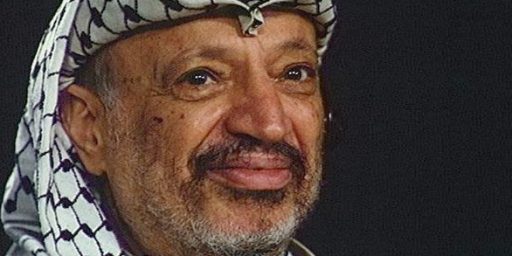Arafat Rejects PM Qureia’s Resignation
WaPo – Arafat Rejects PM Qureia’s Resignation
Palestinian Prime Minister Ahmed Qureia submitted his resignation Saturday, but it was rejected by Palestinian leader Yasser Arafat in a deepening political crisis over corruption, deteriorating security and resistance to reform in the Palestinian Authority. Cabinet ministers said Qureia had insisted his resignation was final. Qureia said he resigned over the growing state of chaos in the Gaza Strip, where the strip’s top police chief, another senior security official and four French nationals were kidnapped by militant groups in three separate incidents on Friday. All of the victims were released unharmed within hours of their abductions, but the Gaza police chief, Ghazi Jabali, was paraded through the streets of a crowded refugee camp and accused of stealing millions in public funds. “This is a true disaster,” Qureia, who is also known as Abu Ala, told reporters before meeting with Arafat and tendering his resignation. “This is a level of chaos that we have never seen before.”
Afterwards, in an emergency meeting, “a majority of the cabinet members urged Abu Ala to retract” the resignation and “he said his resignation stands,” according to Saeb Erekat, the minister for negotiating affairs. Erekat said the cabinet “agreed to continue emergency sessions for next two days,” although Qureia told the group that “he did not resign to make negotiations over it.” Arafat moved to quash the rising complaints about corruption and lawlessness in Gaza by declaring a state of emergency there on Saturday, replacing police chief Jabali, and announcing a major consolidation of 12 Palestinian security services into three agencies. At the same time, Arafat rejected the resignations of two other senior security officials in Gaza who had quit Friday night, complaining about the general state of chaos, political interference with their jobs and the lack of meaningful security reforms.
The events signaled an increasing disenchantment with Arafat’s leadership, and anger at the lack of significant achievements by Qureia and his government after eight months in office. They also underscored the deteriorating security situation in Gaza, where Palestinian militant groups — capitalizing on the general sense of disillusionment — are challenging the Palestinian Authority and its security agencies for control of the streets.
The deteriorating security situation is also a concern in Israel, where Prime Minister Ariel Sharon is pushing a plan to withdraw all Jewish settlers and Israeli soldiers from the Gaza Strip by the end of 2005. Some opponents of the plan are worried that a weak Palestinian Authority will leave a security vacuum in which militant groups such as the Islamic Resistance Movement, or Hamas, and Islamic Jihad, could launch attacks against Israel at will.
It was unclear how significant the changes announced Saturday by Arafat would be. Consolidation of the roughly 12 Palestinian security forces into three agencies under a single unified command has been a top demand of the United States, Israel and the international donor community for years. But several consolidations have been announced in the past, and none has been fully or permanently implemented.
***
Political analysts said that Qureia, 66, learned from Abbas’ tumultuous term that it was futile to confront Arafat, who as nominal president of the Palestinian Authority is the most senior leader and wields near absolute powers. Qureia’s administration has been distinguished by his refusal to publicly stand up to Arafat. There is no Palestinian leader of equal stature waiting in the wings to take over as Prime Minister should the government be disbanded.
Last week, United Nations Middle East envoy Terje Roed-Larsen told the Security Council that Qureia’s government was in a state of “paralysis” and the Palestinian Authority was “in real danger of collapse.” The core problem, he said, was “the lack of political will” to enact reforms, particularly in the security services. In an unprecedented sign of internal dissatisfaction, the al-Aqsa Martyrs Brigades, the armed wing of Arafat’s mainstream Fatah political movement, recently gave the Palestinian leadership a blistering anti-corruption manifesto, calling on Arafat to relinquish some of his powers and demanding that corrupt officials in the Palestinian Authority be fired and prosecuted.
That reporters in the major papers continue to act as if Arafat and Fatah are moderate movements among a sea of terrorists is baffling. Arafat began cozying up to the Islamists over twenty years ago and by the early 1990s was indistinguishable from them. Fatah’s membership below the old guard is comprised of the same type of people that make up HAMAS and al Aqsa and the political goals of all the groups–the annihilation of Israel and the establishment of a single Islamic state–are identical.
See also:
NYT – Palestinian Premier Offers to Resign [RSS]
Reuters – Gaza quiet after kidnappings, but chaos fears rise





In fact, al-Aqsa is frequently described as affiliated with Fatah. Yet somehow no one outside the VRWC/Neo Konkaball seems to connect the dots (to coin a phrase) between the “Martyrs’ Brigade” and Yasser Arafat.